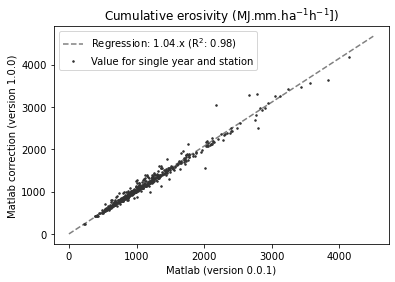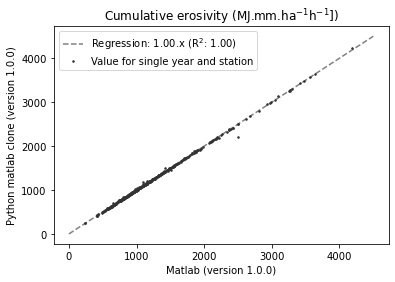Code legacy
The first version of the R-factor scripts was developed by KU Leuven (Laboratory for Experimental Geomorphology, Department of Geography-Geology) in 2001. In 2019, the Matlab script were adopted by VPO, VMM and Fluves. During 2019, a number of bugs were fixed in the Matlab script without using code versioning (see Gobeyn et al., 2021, in Dutch). Since 2021, code versioning via git is applied (i.e. version 0.0.1). The Matlab scripts were evaluated and translated to Python in order to optimize performance, code readability and user-friendliness. During this evaluation phase a number of additional bugs were identified and corrected. In the following section a brief comparison is presented between the Matlab (version 0.0.1) and Python implementation.
For the code comparison, both the Matlab code and the reimplementation in Python are run with rainfall input data from Belgium (KMI and VMM). In the figure below, a comparison is shown between the Matlab code available in version 0.0.1, on the one hand, and the Python version on the other. For this figure, the cumulative erosivity at the end of the year was compared for all years of all stations individually. Differences are explained by a if/else-case defined in the Matlab version 0.0.1 in which the maximum 30-minute intensity was mistakenly multiplied by two. In addition, incorrect indices for the first rainfall record were used in the computation of the maximum 30-minute rainfall intensity.

In the next figure, the comparison is made between the corrected Matlab version (1.0.0) and the Python reimplementation. Here the minor deviations are related to decimal precision.

Currently, the Python implementation is adopted for future developments and applications and unit tests included to guarantee the future consistency.
References
Gobeyn, S., Van de Wauw, J., De Vleeschouwer, N., Renders, D., Van Ransbeeck, N., Verstraeten, G., Deproost, P., 2021. Herziening van de neerslagerosiviteitsfactor R voor de Vlaamse erosiemodellering. Departement Omgeving, Brussel.